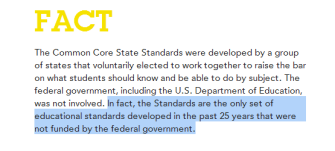UPDATED
As part of the effort by business groups and other friends of the Common Core State Standards to buttress support for them this year, a new website from the Higher State Standards Partnership aims to counter myths about the standards with facts. As part of this effort, the site, which is supported by the U.S. Chamber of Commerce and the Business Roundtable, addresses one prominent claim about the standards: that the federal government created them and manages them in the states. Here’s how the site responds to that claim:

No one has presented any credible evidence that the common core was federally funded. Just because the feds support an initiative like common core doesn’t mean they paid for it. However, the second sentence in that mythbusting “fact” is what caught my attention, and so I highlighted it. That statement covers education policy territory well before common core and even No Child Left Behind. Let’s examine it.
I asked the U.S. Chamber for the evidence supporting the statement. The Chamber sent me testimony from Michael Cohen, a former assistant secretary at the U.S. department and now the president of Achieve, a nonprofit that helped to develop the common core, to the Michigan House of Representatives last July. Cohen provides a lot of interesting history about state standards—on the subject of this particular inquiry, he pointed to the initiative by then-Secretary of Education Lamar Alexandar (now a Republican U.S. senator) in 1990 to provide $40 million to “nearly every state” to help underwrite the development of content standards. The 1994 reauthorization of the Elementary and Secondary Education Act, Cohen notes, required states to have content standards as a condition for receiving Title I funds. NCLB, remember, also requires states to have standards in order to receive federal cash.
The administration of President George H.W. Bush also provided financial support for national organizations to develop content standards in various subjects. And the Goals 2000 program under the Bill Clinton administration also included standards creation as a key element.
Here’s how the U.S. Chamber of Commerce Foundation’s Education and Workforce program summarized the statement to me:
@StateEdWatch They were either through direct grants to develop standards or states received fed funds as condition of developing standards
— USCCF Ed & Workforce (@USCCFeducation) February 7, 2014
Based on that statement, it seems as though the claim rests (in part) on the idea that if standards are a requirement for states to receive money from Washington like Title I dollars, that means it’s fair to say the standards are federally funded. But is that logically consistent? That description makes the standards sound more like an unfunded mandate from Washington, rather than a federally funded initiative. The U.S. Chamber isn’t claiming that funds as dictated by NCLB directly funded standards, only that without standards, states couldn’t get funds like Title I.
I called up a state that hasn’t adopted the common core, Virginia, to ask if its content standards, called the Standards of Learning, have been federally funded. Julie Grimes, the patient spokeswoman for the state education department, subsequently provided a very detailed answer.
Federal Title II dollars are intended to support the recruitment and development of high-quality teachers and principals. Grimes highlighted Title II Section A money that in Virginia has been used to help teachers review the Standards of Learning. That review helps the teachers prepare to use the standards in the classroom, since, Grimes pointed out, the state doesn’t want to “just spring” new standards on educators. But It doesn’t give those teachers input or power as the standards are being created.
“That is not the same as developing the standards,” Grimes wrote to me in an email about the Title II Section A cash.
The Virginia Department of Education develops the Standards of Learning, Grimes said, using state and not federal money.
As I said at the beginning of the post, the federal role in common core’s progress will get a lot of hackles up. It’s interesting that the U.S. Chamber of Commerce and the Business Roundtable felt the need not just to rebut claims about Washington and the common core, an understandable move backed up by the facts, but to make a broader statement about content standards that, if you talk to Virginia at least, is inaccurate.
UPDATE: On the point of NCLB funding for standards, I should point out that Title VI under federal education law does provide money to help states develop “additional standards” to meet federal requirements if necessary. (Thanks to Chad Colby at Achieve for pointing this out.) If a state’s standards already meet those requirements, however, it can use this money for tests or other matters. So to call state standards strictly an unfunded mandate under NCLB is off the mark.
The question of how many states didn’t use that earmarked Title VI money to develop standards, at the same time that they were reviewing and updating standards, isn’t one I’ll try to answer here. The Virginia Department of Education’s response is clear. Still, given the history of the federal government’s involvement, it’s clear that Washington has long had a direct interest in content standards, and has in fact put some money on the table to ease them along in the last 25 years.
